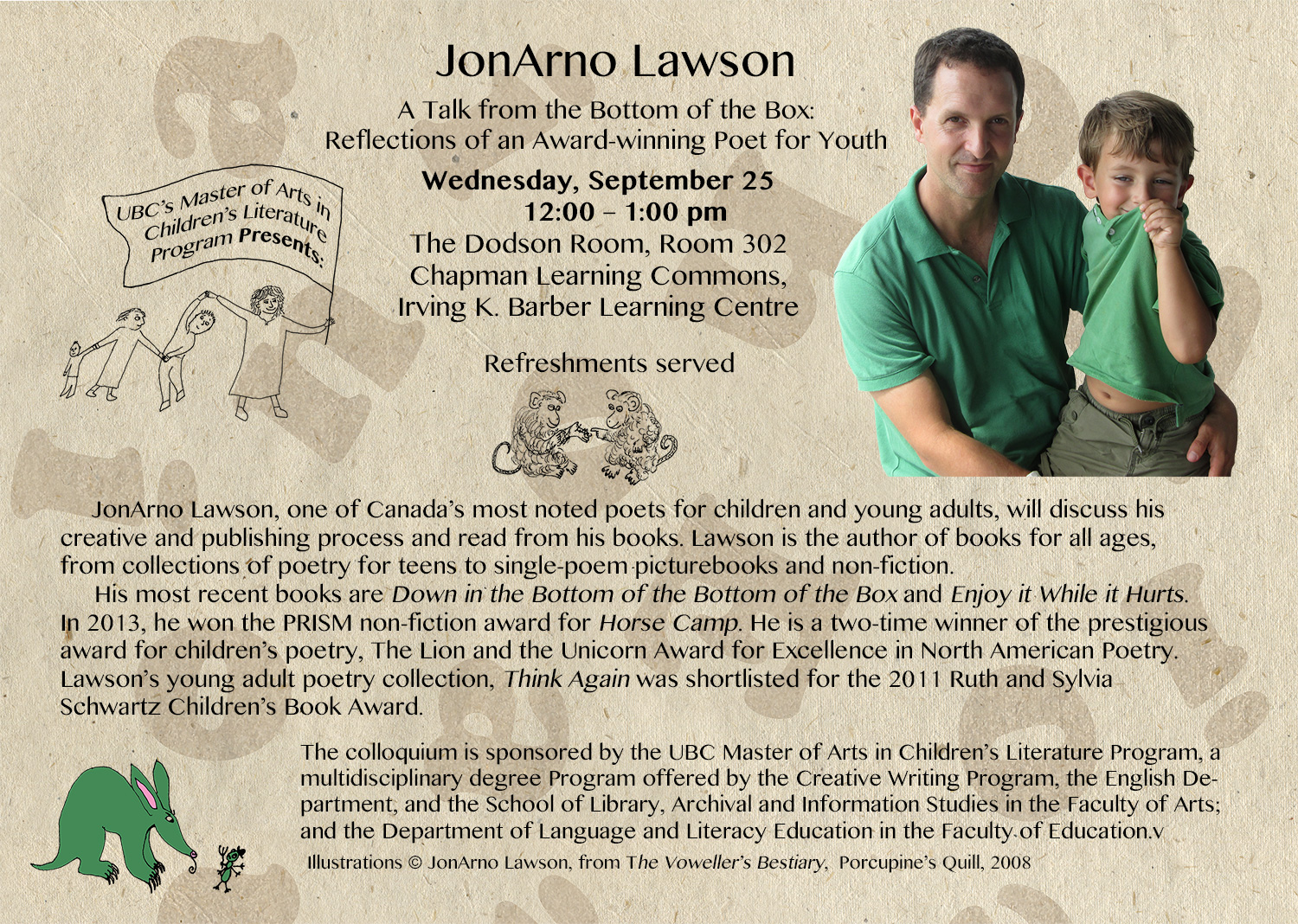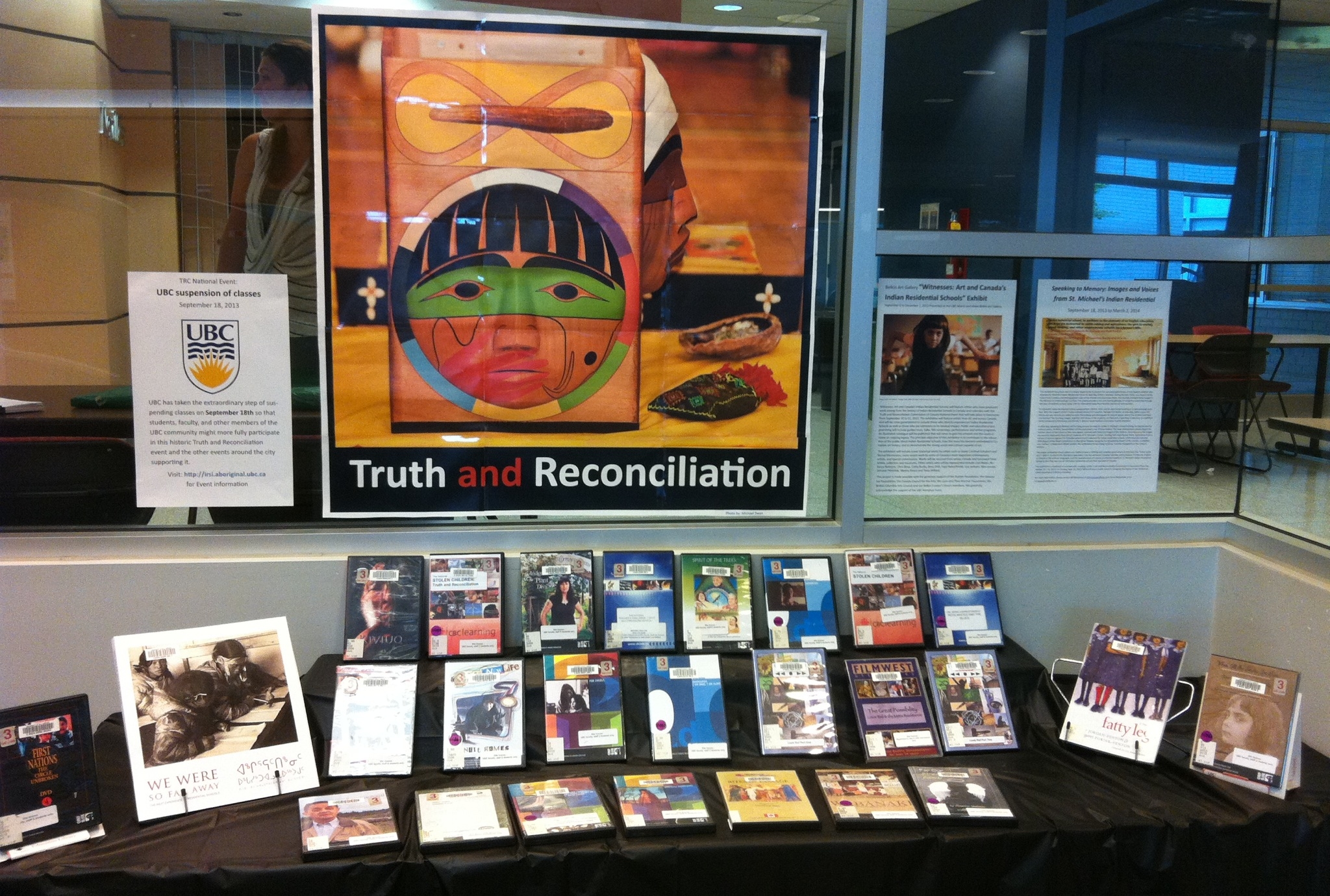Stay up to date on news, events and special features.
New ‘Truth and Reconciliation’ display at Education Library
The new ‘Truth and Reconciliation’ display is now up at UBC’s Education Library in time for the new term in September.
The display features DVDs and books related to the human rights abuses in the Canadian Indian residential school system and related Aboriginal issues.
UBC is suspending classes on September 18 to allow the campus community to participate in activities related to Truth and Reconciliation Commission’s (TRC) final national event on the West Coast that day.
More from the Truth and Reconciliation Commission of Canada website:
“Residential schools for Aboriginal people in Canada date back to the 1870s. Over 130 residential schools were located across the country, and the last school closed in 1996. These government-funded, church-run schools were set up to eliminate parental involvement in the intellectual, cultural, and spiritual development of Aboriginal children.
During this era, more than 150,000 First Nations, Métis, and Inuit children were placed in these schools often against their parents’ wishes. Many were forbidden to speak their language and practice their own culture. While there is an estimated 80,000 former students living today, the ongoing impact of residential schools has been felt throughout generations and has contributed to social problems that continue to exist.
The Truth and Reconciliation Commission of Canada has a mandate to learn the truth about what happened in the residential schools and to inform all Canadians about what happened in the schools.”
CTLT and UBC Library: Connect, Course Reserves and Copyright– Full Day Drop-In Support August 29
 CTLT and UBC Library: Connect, Course Reserves and Copyright –Full Day Drop-In Support
CTLT and UBC Library: Connect, Course Reserves and Copyright –Full Day Drop-In Support
When: August 29, 2013 10-4pm
Where: Irving K Barber Learning Centre – Seminar Room 2.22A
Are you struggling with a particular feature(s) of Connect, want a quick recap or just need to discuss the structure of your course materials? Do you need help with creating your course reserves lists? Do you have questions about copyright and your course content? If yes, come to the Connect All-Day Drop-in, talk to the CTLT and UBC Library specialists and get one-on-one assistance with your Connect course, course reserves and copyright issues!
JonArno Lawson, one of Canada’s most noted poets, will discuss his creative and publishing process and read from his books September 25th
 UBC’s Master of Arts in Children’s Literature Program
UBC’s Master of Arts in Children’s Literature Program
Presents: A talk and reading from his work by Canadian poet for children and young adults
JonArno Lawson
Entitled:
A Talk from the Bottom of the Box: Reflections of an Award-winning Poet for Youth
Wednesday, September 25th, 2013, 12:00 – 1:00 pm
The Dodson Room, Room 302, Level 3, Chapman Learning Commons, Irving K. Barber Learning Centre, 1961 East Mall, University of British Columbia
Refreshments served
JonArno Lawson, one of Canada’s most noted poets for children and young adults, will discuss his creative and publishing process and read from his books. Lawson is the author of books for all ages, from collections of poetry for teens to single-poem picture books and non-fiction.
His most recent books are Down in the Bottom of the Bottom of the Box and Enjoy it While it Hurts. In 2013 he won the PRISM non-fiction award for a piece he wrote called Horse Camp.
He is a two-time winner of the prestigious award for children’s poetry, The Lion and the Unicorn Award for Excellence in North American Poetry. The 2009 jury stated that his award-winning A Voweller’s Bestiary, From Aardvark to Guineafowl (And H) is “not just this year’s best book of children’s poetry, it is one of the year’s best books of poetry period.”
The 2007 jury stated that Lawson’s Black Stars in a White Night Sky is a “beautifully designed book filled with well-crafted poems…. Lawson is in a class by himself.”
Lawson’s young adult poetry collection, Think Again was shortlisted for the 2011 Ruth and Sylvia Schwartz Children’s Book Award.
Lawson has taught children’s poetry in the Master of Arts in Children’s Literature Program at Simmons College, Boston, and gives workshops for children and adults.
The colloquium is sponsored by the UBC Master of Arts in Children’s Literature Program, a multidisciplinary degree Program offered by the Creative Writing Program, the English Department, and the School of Library, Archival and Information Studies in the Faculty of Arts; and the Department of Language and Literacy Education in the Faculty of Education.
To read more about this and other fabulous upcoming children’s literature events go to www.vclr.ca
National School Library Day Colloquia: Save-the-Date!
 As we enter the Year of Teacher Education please join us at an exciting event: BC’s New Education Plan: School Libraries at the Centre of Learning.
As we enter the Year of Teacher Education please join us at an exciting event: BC’s New Education Plan: School Libraries at the Centre of Learning.
Description:
Personalized learning for every student, quality teaching, flexibility and choice, and learning empowered by technology – these goals of the BC Education Plan are central to effective school library programs. Teacher-librarians collaborate with teachers so that kids engage in inquiry and have greater opportunities to employ critical thinking and creativity. Never before has there been a better time for teachers to learn to teach with teacher librarians than now. Join our National School Library Day conversation, to hear from our panel as they talk about the role of teacher-librarians and school libraries in the BC Education Plan.
Speakers:
Jacqueline Van Dyk, Director, Libraries and Literacy, BC Ministry of Education
Patricia Finlay, Teacher Librarian Mentor, Burnaby School District
Gino Bondi, District Principal, Specialty Programs, Vancouver School District
Details:
When- October 22, 2013 4:30-6:00 p.m.
Where- Dodson Room, Irving K. Barber Learning Centre, UBC
Refreshments will be served.
Hosted by the Education Library and UBC iSchool.
Picture books boost literacy
 An article from the Daily Mail this week highlights a new study from the Max Planck Child Study Centre at Manchester University. The study found reading a picture book with one or two words per page to be just as beneficial for a pre-school child as reading one with long sentences.
An article from the Daily Mail this week highlights a new study from the Max Planck Child Study Centre at Manchester University. The study found reading a picture book with one or two words per page to be just as beneficial for a pre-school child as reading one with long sentences.
From the article: “The key to success is as much talking about what happens in the book as reading the text. Simple text tends to stimulate complex discussions between adult and child, whereas complicated sentences reduce the need for dialogue, the study concluded.”
